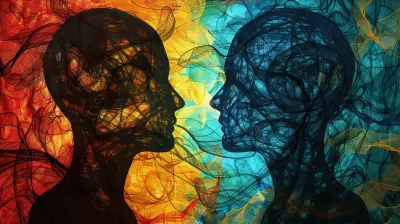13 April 2025
Ever caught yourself justifying a decision that, deep down, you knew was a terrible idea? Maybe you bought an expensive gadget you didn’t need and suddenly found yourself listing all the ways it was a “smart purchase.” Or perhaps you stayed in a toxic relationship, telling yourself, "It’s not that bad!" even when all signs pointed to an exit.
That, my friend, is cognitive dissonance at work—the mental gymnastics we perform to keep ourselves from feeling uncomfortable. It's a psychological phenomenon that shapes our thoughts, beliefs, and actions, sometimes in ways we don’t even realize. So, let's break it down and uncover how this sneaky little force drives our decision-making process. 
What is Cognitive Dissonance?
In simple terms, cognitive dissonance is that uneasy feeling you get when your actions contradict your beliefs or values. Coined by psychologist Leon Festinger in 1957, the theory suggests that we humans have a deep need for internal consistency. When there's a mismatch between what we believe and what we do, our brains scramble to resolve the tension.Think of it like a mental tug-of-war. On one side, your belief says, "I’m an honest person." On the other, your action says, "I just lied to my boss about why I was late." That internal conflict? That’s dissonance kicking in.
And instead of admitting the mistake, your brain might go into justification mode:
- "It was just a small lie."
- "Everyone does it."
- "I didn’t want to hurt their feelings."
Boom. The dissonance fades, and your brain is at peace again. But this dance between belief and action happens constantly in our everyday lives, shaping how we think, what we do, and even what we believe to be true. 
How Does Cognitive Dissonance Influence Our Beliefs?
Here’s where things get really interesting—cognitive dissonance doesn’t just affect our actions; it actually reshapes our beliefs to align with what we do.1. The Power of Justification
Have you ever noticed that when people spend a ton of money on something, they tend to rave about it, even if it wasn’t that amazing? That’s because admitting they wasted their money would be painful. Instead, their brain goes, "This was a great investment!"—all to avoid that dissonant feeling.This explains why people who go through hell to join an exclusive group (like hazing in fraternities) tend to become die-hard members. The suffering makes them value the experience even more—because otherwise, all that effort would feel pointless.
2. Changing Beliefs to Match Behavior
Here’s a wild example: If someone who considers themselves an environmentalist starts driving a gas-guzzling SUV, instead of admitting they're being hypocritical, they might start downplaying climate change. "Maybe it’s not that big of a deal!" they tell themselves.By shifting their belief, they remove the dissonance. And just like that, a once-strong stance starts to wobble.
3. The More Effort, The Stronger the Conviction
Ever wondered why some people stubbornly cling to bad decisions? Whether it’s staying in a failing business, defending a questionable political view, or continuing a toxic relationship—once we’ve invested time, money, or effort, our brains want to believe it was all worth it.This is called the "effort justification" principle. The more effort we put into something, the harder it is to admit we were wrong. It’s like spending years climbing a mountain only to realize halfway up that it was the wrong one—but instead of turning around, we convince ourselves the view at the top is definitely worth it. 
How Cognitive Dissonance Influences Our Actions
Just as our beliefs shape our actions, the reverse is also true. We often change our actions to align with the beliefs we already hold—or, more interestingly, we take action first and adjust our beliefs afterward to justify it.1. The “Foot-in-the-Door” Effect
Ever agreed to a small favor, only to find yourself roped into something way bigger later? That’s cognitive dissonance at play.Psychologists call this the foot-in-the-door technique—once you commit to a small act, you’re more likely to follow through with a larger one to stay consistent with your perceived self-image. Marketers and salespeople love this trick. That’s why free trials, test drives, and “just sign up for our newsletter” tactics work so well.
2. Moral Compromises and Slippery Slopes
Cognitive dissonance can also explain how small ethical compromises lead to bigger ones. Someone who cheats “just a little” on their taxes might later justify full-blown tax fraud. A person who tells a white lie might find themselves comfortable with bigger deceptions down the road.This is what psychologists call the gradual escalation effect—once we justify a small unethical act, the mental resistance to larger ones weakens over time.
3. Why We Double Down on Bad Choices
Here’s a frustrating truth: The more we argue in favor of something, the more deeply we believe it—even if evidence suggests otherwise.When we publicly commit to an opinion, admitting later that we were wrong creates a massive dissonance. Instead of changing our opinion, we often dismiss opposing evidence or twist facts to fit our narrative. Social media has turned this into an extreme sport. The louder and more publicly we voice a belief, the harder it becomes to let it go. 
Fighting Back: Overcoming the Trap of Cognitive Dissonance
So, if cognitive dissonance is constantly pulling the strings behind the scenes, how do we fight back? A few strategies can help us stay self-aware and avoid falling into mind traps.1. Be Comfortable With Discomfort
Feeling that twinge of dissonance when something contradicts your beliefs? Instead of scrambling to justify it, sit with it. Ask yourself:- Am I changing my belief just to avoid discomfort?
- What does the evidence actually say?
The more you embrace that uncomfortable feeling, the better you get at making rational decisions.
2. Challenge Your Own Beliefs
Actively seek out opinions that contradict your own. It’s easy to fall into an echo chamber where everyone agrees with you, but true growth comes from questioning what you think you know.3. Accept That Mistakes Are Okay
A huge reason we experience cognitive dissonance is that we hate admitting we were wrong. But making mistakes is human. Own up, adjust, and move forward—it’s way healthier than bending over backward to defend a decision you secretly regret.4. Recognize When You’re Justifying Actions
Caught yourself making excuses or stretching the truth to align with your past choices? That’s a red flag that cognitive dissonance is in full swing. Pause, acknowledge it, and reevaluate your stance.Final Thoughts
Cognitive dissonance is more than just a psychological quirk—it’s a powerful force that subtly molds our beliefs and actions every single day. Whether it's justifying bad purchases, rationalizing poor decisions, or clinging to outdated beliefs, our brains are wired to seek consistency—even if it means distorting reality.The good news? By becoming aware of it, we can start making more intentional choices, embrace the occasional discomfort of being wrong, and ultimately, live with greater clarity and self-awareness.
So next time you catch yourself performing mental gymnastics to justify a decision… pause. Maybe, just maybe, cognitive dissonance is pulling the strings.





Astrid McIlwain
Cognitive dissonance: the ultimate mental tug-of-war! It’s like telling yourself, “I’ll eat healthy” while eyeing that slice of chocolate cake. Just remember, if your beliefs were a circus, cognitive dissonance would definitely be the clown juggling your logic! 🎪🍰
April 15, 2025 at 4:23 AM